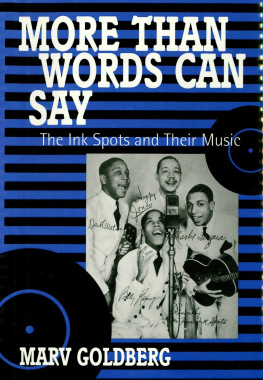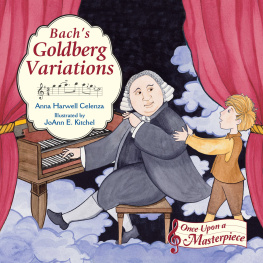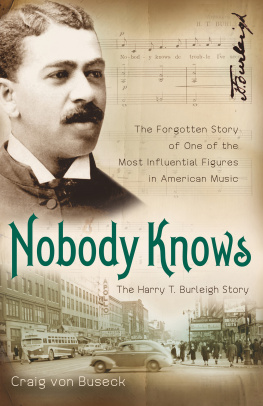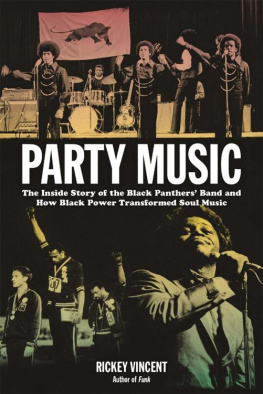Acknowledgments
Thanks are due to many people who helped me in my research. The original work was an extensive article in the rhythm and blues magazine Yesterdays Memories (Number 9, March 1977), written in the main by Pete Grendysa, George Moonoogian, and Rick Whitesell, with information provided by my interviews (augmented by their own research). The section on the Brown Dots is a synopsis of an article that I wrote with my friend and partner in Yesterdays Memories, Mike Redmond.
Most of the photographs of the Ink Spots used herein are from the collection of Paul Scriven, unless otherwise credited. Paul provided me with a carton full of photos and clippings, many of which were indispensable. Michael Ochs, of the Michael Ochs Archives/Venice, California, sent me loads of photostats of various Ink Spots groups that I used to attempt to sort out personnel changes over the years.
For more recent help, I have to thank Ray Funk, Galen Gart, Bob Pruter, Bill Proctor, Mike Caldarulo, and Andy McKaie and Barbara Kaufman (of MCA Records). Also, thanks to George Moonoogian and Dave Hinckley, for taking the time to read and critique the manuscript.
Thanks are also due to the following periodicals, whose publishers graciously granted me permission to quote from their publications: BPI Communications (the Billboard ), Variety, the Chicago Defender, the Afro-American Co. of Baltimore City (T/A the AFRO-AMERICAN NEWSPAPERS the Baltimore Afro-American), the New York Post, the Boston Herald, the New York Amsterdam News, the Cleveland Call And Post, Down Beat magazine, and the New York Times. All direct quotes are copyrighted by these publications, on the dates given in the notes.
Quotes from Deek Watsons book The Story Of The Ink Spots were used by permission of Shirlita H. Watson (aka Lee Stephenson).
Finally, its difficult to remember any project that Ive worked on that didnt include thanks to Ferdie Gonzalez (or should have, if I left it out). His discographical work in rhythm and blues and rock and roll is beyond measure. Almost all the record listings appearing in this book were based on entries in the latest version of his book Disco-File.
About the Author
Marv Goldberg is a music historian in the field of rhythm and blues and rock and roll. Ever since first hearing Alan Freed in mid-1955, at the tender age of 11, hes been lost in the sounds of black vocal group music.
Having interviewed more than 150 singers, Marv has written for most of the genre publications: Bim Bam Boom, Record Exchanger, Record Collectors Monthly, Goldmine, Big Town Review , and the much-missed Whiskey, Women, And .... From 1975 to 1977, he was owner/editor of Yesterdays Memories (with partners Mike Redmond and Marcia Vance). He currently writes a monthly column for Discoveries magazine, in which hes profiled the Clovers, 5 Keys, Ravens, Orioles, Penguins, Dominoes, Teenagers, and a host of less-famous groups. Another facet of his writing is the liner notes that hes done for about two dozen record albums.
A frequent guest on area oldies radio shows, he also hosts a weekly show of his own. He prides himself on not only liking rhythm and blues, but actually listening to the lyrics. This is his first book.
A systems analyst by day, Marv currently lives, with his wife and stuffed aardvark, in Long Island, New York.
Notes
Introduction (page xiii)
Herb Kenny, as quoted in the Howard County Sun , July 25, 1990.
Decca Records, liner notes for release number 1-706 (part of Deccas Curtain Call series, 1952).
Decca Records liner notes for 1-706.
Prelude: The 1920s to 1931 (page 1)
Claire Keefner, Remembering The Big Time in the Alaska Ruralite , January 1987, 4. The article is based on an interview with Mifflin Miff Campbell, at the time an 80-year-old Alaska resident. He died in April 1995.
Interview with Jerry Daniels, 6/8/92.
Deek Watson (with Lee Stephenson), The Story of the Ink Spots (Vantage Press, New York, 1967), 13.
Interview with Jerry Daniels, 6/8/92.
Interview with Bernie Mackey, 7/18/76.
1932 (page 7)
Interview with Jerry Daniels, 9/8/75.
Ibid.
Ibid.
1933 (page 11)
Interview with Jerry Daniels, 10/24/91.
1934 (page 15)
Jack Schiffman, Uptown, The Story of Harlems Apollo Theatre (Cowles, New York, 1971), 153.
Schiffman, 159.
Earl Wilson column, New York Post, April 28, 1941.
Variety, September 18, 1934, 49.
Variety, October 2, 1934, 70.
Deek Watson, 25
Watson, 25.
Interview with Jerry Daniels, 10/31/91.
Watson, 26.
Interview with Daniels, 10/31/91.
1935 (page 23)
Baltimore Afro-American , February 23, 1935.
Interview with Jerry Daniels, 9/8/75.
Baltimore Afro-American , March 16, 1935.
Baltimore Afro-American , April 13, 1935.
Baltimore Afro-American, May 11, 1935.
1936 (page 29)
Interview with Jerry Daniels, 9/8/75.
Interview with Herb Kenny, 12/29/91.
Deek Watson, 31.
Intermezzo I: Jerry Daniels (page 35)
Interview with Jerry Daniels, 9/8/75.
1937 (page 39)
Variety, January 27, 1937, 47.
Variety, May 18, 1938, 41.
Variety , June 23, 1937, 53.
Variety, January 27, 1937, 43.
Variety, March 10, 1937, 45.
Variety, August 11, 1937, 47.
Variety, August 11, 1937, 47.
Variety, May 12, 1937, 34.
1938 (page 45)
New York Amsterdam News, January 7, 1939, 16.
1939 (page 49)
This song was never recorded by the Ink Spots, but it appears on a 1980 album that presented two full Ink Spots radio shows. The Old Spinning Wheel was from an August 9, 1935, WJZ show. The album (The Ink Spots On The Air, Totem 1020) also contains their WFIL broadcast of July 12, 1939, as well as some tunes broadcast on the Kraft Music Hall show of February 27,1941 (with host Bing Crosby), and one contribution to Armed Forces Radio Service (AFRS): a Jubilee program from 1944. Other songs that they sang on the 1935 show were Did You Ever See A Dream Walking? Babs, and Baby Brown.
Chicago Defender, June 30, 1945, 20.
1940 (page 59)
Down Beat, April 25, 1940.
Billboard, January 13, 1940, 9.
Chicago Defender, April 13, 1940, 10.
Billboard, January 20, 1940, 74.
Cleveland Call And Post, January 11, 1940, 3.
Chicago Defender, October 19, 1940, 19.
Down Beat, December 1, 1940.
Jack Schiffman, 140.
Variety, February 7, 1940.
Billboard, special Talent and Tunes on Music Machines supplement, September 28, 1940, 12.
Billboard, November 23, 1940, 13.
1941 (page 75)
Metronome, April 1941.
Chicago Defender, May 10, 1941, 10.
Earl Wilson column, The New York Post, April 28, 1941.
Down Beat, October 15, 1940.
Interview with Bill Doggett, 1/15/92.
Billboard, January 17, 1942, 21.
1942 (page 89)
Billboard, February 21, 1942.
The Ink Spots On The Air, (Totem 1020, 1980). See note 1 under heading 1939. It contains this one, undated cut labeled test pressing.
Interview with Bill Doggett, 1/15/92.









